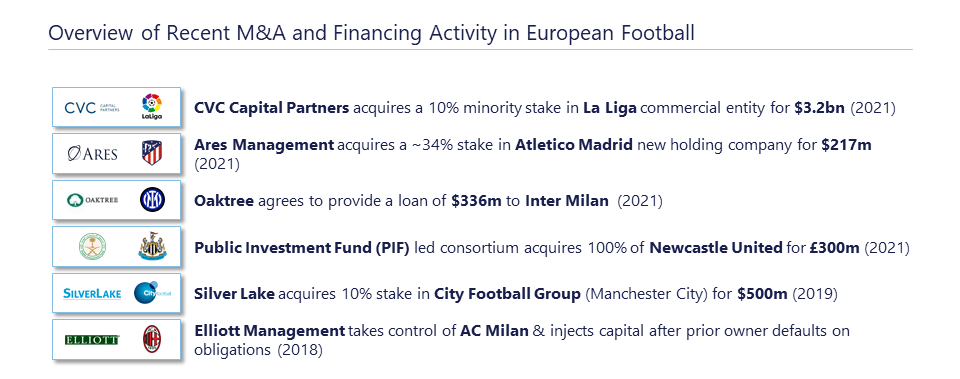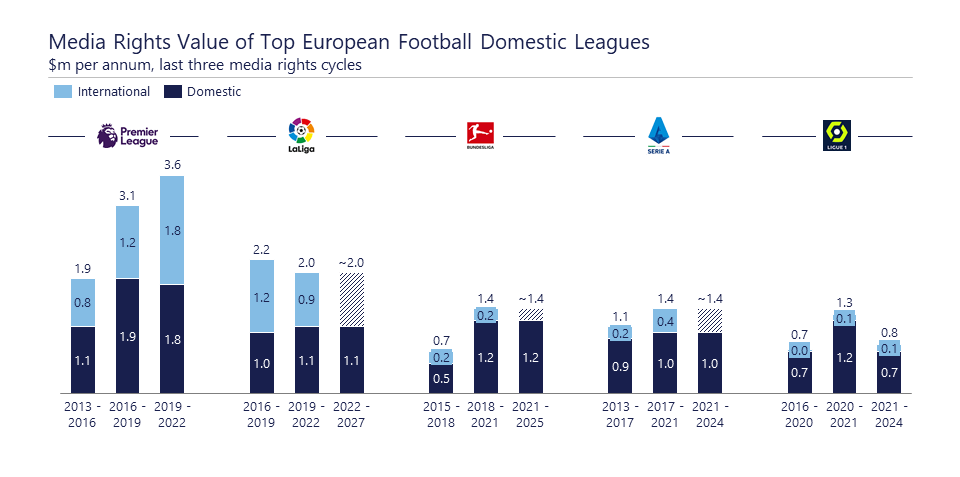Top football leagues see new monetization and expansion opportunities in international markets, including digitally enabled ones
It’s not controversial to say that the top European football leagues are immensely popular in their home countries, enjoying lucrative broadcast rights deals, employing the world’s best football stars, and packing stadiums with loyal fans.
Despite this success, there are signs that these leagues are bumping up against a ceiling in their domestic markets, particularly in terms of media rights. However, the leagues can devote more attention towards global markets, where European football already enjoys solid popularity and strong potential for growth – and the opportunity is not only about what happens on the pitch or with TV rights. As sports media continues to expand, European football leagues and clubs can pursue new monetization strategies in global markets, in everything from blockchain to the Metaverse.
In recent years, the success of the English Premier League, Bundesliga, La Liga, and others has attracted significant investment activity as investors favor the positive financial profiles and growth outlooks for leagues and clubs. Over the past year, an even larger number of investments have been discussed as leagues and clubs seek new financial strategies to recover from COVID-19.

But amid all this investment activity, there are signs that European football is bumping up against the capacity of its local markets. The domestic rights value of top European competitions flattened at the latest auctions – and some have even lost value. Key reasons that domestic rights have not achieved growth include declining competitive intensity amongst bidders, little room to increase prices, limited fanbase growth, and rights auction timing.

At the same time, international rights have emerged as a potential source for more growth. Fertile markets in North America, Latin America, and Asia provide European leagues the opportunity to increase media rights revenues through growing interest and willingness to pay among international fans.
“International interest in football is well known, but the global reach and popularity of Europe’s top football leagues and clubs is unmatched by any other sports export. We are seeing unparalleled tailwinds in international deals – some that are demanding higher multiples than previously seen,” said Ian Lube, partner in Altman Solon’s London office.
Altman Solon’s 2021 Global Sports Survey, which gauged viewing and fandom among 18,000 respondents in 16 countries across North America, Europe, Latin America, and Asia, shows that European football leagues/competitions are among the top 10 most popular competitions across multiple international markets.
In addition to international growth, many adjacent growth strategies are available to football leagues and teams to increase direct engagement with fans and create new monetization opportunities. Growth strategies include developing new content distribution models, such as direct-to-consumer propositions, which can address prospective fans and/or provide complementary content and services to the most engaged fans with higher willingness to pay.
Sports merchandising – everything from kits to rucksacks to boots – is another important source of revenue for European leagues abroad. In the U.S., football fans can purchase an array of merchandise licensed from European leagues, including EPL footballs through Nike and Paris Saint-German kits through Fanatics.
And as new technologies emerge, like the launch of new immersive online environments (e.g., the Metaverse), European leagues can make inroads with fans of gaming and eSports. Recently, several European football clubs partnered with blockchain companies to launch new digital fan engagement platforms, tokens, and trading cards.
“While broadcast rights are still the big prize for football leagues, the innovations in media and social media create platforms for both new monetization strategies and fan loyalty through increased digital engagement,” said Matt Del Percio, director at Altman Solon in New York City.
For more insights from Altman Solon’s Global Sports Survey please click here.